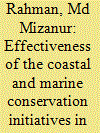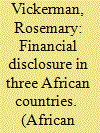|
|
|
Sort Order |
|
|
|
Items / Page
|
|
|
|
|
|
|
| Srl | Item |
| 1 |
ID:
105186


|
|
|
|
|
| Publication |
2011.
|
| Summary/Abstract |
In the 1990s, Taiwan and China conducted over twenty rounds of negotiations through the semi-official Strait Exchange Foundation (SEF) and the Association for Relations across the Taiwan Strait (ARATS) concerning the following issues: notarized papers, registered mail, illegal immigration, fishing disputes, airplane hijacking, and post-1997 shipping links between Taiwan and Hong Kong. Regrouping these issues into rights, law-and-order, and shipping, this study analyzes the differences in the negotiation processes and outcomes through variations of value-interest alignments and their perceived impact on future policy objectives.
|
|
|
|
|
|
|
|
|
|
|
|
|
|
|
|
| 2 |
ID:
111659


|
|
|
|
|
| Publication |
2012.
|
| Summary/Abstract |
The credit rating agencies that dominated the ratings of mortgage-backed securities were Moody's and Standard & Poor's. The two agencies rated some 4.3 trillion dollars of bonds as triple AAA, yet within a period of 18 months these same rating agencies downgraded these bonds to below investment grade. This paper seeks to show that the ratings agencies business model, the issuer pays approach, led to major conflicts of interest with both the ratings agencies unable to walk away from a rating. The evidence given by analysts to Congressional Inquiries confirms a cultural revolution within the rating agencies, with analysts feeling unable to question the quality of a rating. Analysts who were described as being awkward by issuers were removed from the rating process. In the meantime, the income for the rating agencies increased from 3 billion dollars to 6 billion dollars, with the CEOs of the rating agencies receiving incomes comparable to the incomes to the CEOs of investment banks.
|
|
|
|
|
|
|
|
|
|
|
|
|
|
|
|
| 3 |
ID:
188397


|
|
|
|
|
| Summary/Abstract |
The study attempted to identify the challenges and threats to coastal and marine conservation and assessed the effectiveness of the existing legal, policy, and institutional frameworks in this regard. This multidisciplinary research used both primary and secondary data. It was revealed that in the protected areas, both conservations and degradations go hand in hand, indicating the ineffectiveness of regulatory schemes. Ironically, many destructive activities like wetland poisoning, onslaught wildlife poaching, and clear felling of mangrove tree species threaten conservation initiatives in the coastal habitats. There is no specific law and policy which can effectively regulate marine and coastal resource management and conservation. Instead, many fragmented laws and policies created jurisdictional overlapping, followed by interest conflicts in most cases. The study recommends legal and institutional reforms to abolish jurisdictional overlapping and establish effective marine governance. The study proposed a model of an evidence-based national marine policy based on stakeholders’ perceptions.
|
|
|
|
|
|
|
|
|
|
|
|
|
|
|
|
| 4 |
ID:
097698


|
|
|
|
|
| Publication |
2009.
|
| Summary/Abstract |
Many countries use financial disclosure to manage conflicts of interest. This article
examines disclosure in three African countries: Cameroon, Ghana and South Africa.
These countries fall on a continuum that sees South Africa as the relative success
story, Ghana as occupying the middle position, and Cameroon as failing thus far.
Disclosure regulations detailing who discloses, how often this occurs and what and
when sanctions are to be taken for breaching regulations are presented in brief. Three
key recommendations are made in relation to the legislation and the implementation
thereof. First, it is suggested that in South Africa and Ghana the process of instituting
sanctions be streamlined and, second, that those tasked with keeping the registers of
financial interests are provided with the necessary investigatory powers. Finally, it is
recommended that Ghana and Cameroon practise annual disclosure.
|
|
|
|
|
|
|
|
|
|
|
|
|
|
|
|
|
|
|
|
|